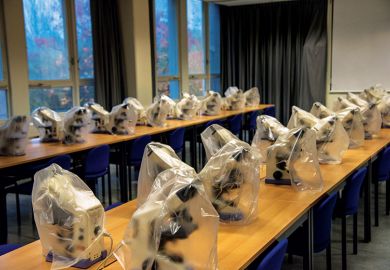The pandemic has raised many questions about the future direction that higher education should take. But while much of the discussion has centred on the mode of instruction – to stay online or return to bricks and mortar – there has been less discussion around what education is for and therefore what should be valued in the future.
Take employability. This is clearly an important aspect of the holistic learning and development process, but the lockdowns and the attendant threats to entire industries demonstrate the limits of universities’ power to usher their students into specific jobs, given that universities do not control the job market. We can and do support students for life after graduation, but there is only so much we can do to support future employment prospects.
Treating education as a cookie-cutter process that simply transfers knowledge and a narrow predetermined skill set to an individual is doomed to failure in the longer term, wasting financial and human capital along the way. Yet politicians struggle to grasp this fact. The new funding models for universities in Australia assume a transactional relationship between education and jobs, while the UK government positions employment metrics as its most valued measure of institutional success.
Part of the reason for this no doubt relates to the fact that graduate jobs can be counted relatively easily and fed into league tables. But, as the adage goes, not everything that matters can be measured and not everything that can be measured matters. If a university specialised in preparing graduates for specific industries that disappeared as a result of the lockdown, would it be fair to conclude that that university had failed?
Of course, employment needs will always change and as technology advances, the technical skills embedded in the curriculum should remain a critical consideration for education. However, these skills are perishable; the world evolves. Instilling a mindset aligned to lifelong learning becomes even more important here. Higher education must always be a place of learning not only knowledge and skills but also how to learn so that graduates are better equipped to adapt and flex as required in the future.
Moreover, gaining more durable personal qualities and capabilities – such as creativity, innovation, resilience, emotional intelligence and self-efficacy – is also more necessary for graduates than ever before. We future-proof students by nurturing the ability to reflect on and learn from their experiences, enabling them to recognise and value these other crucial human qualities and behaviours that contribute to both employability and society. In this way, employability is not only about how we can create, add and transfer value but also, fundamentally, about who we are as people.
This process of self-reflection and personal development to address these kinds of personal qualities and capabilities is not new. Consider, for example, how these aspects of learning are valued and assessed in nursing, social work and teacher training. But, critically, are we reaching all students beyond these types of courses with this combination of learning opportunities? This work can be scaffolded not only within such curricular contexts, but also in co-curricular and extra-curricular spaces, and this life-wide learning needs to be positioned alongside a renewed focus on lifelong learning.
Universities are uniquely positioned to support students to recognise and value this learning in all its forms, identifying and unlocking the lessons and benefits of all lived experiences and inculcating the qualities and capabilities – alongside the knowledge – that graduates will need to thrive and adapt in a much tougher post-Covid employment market.
But how can you measure value when viewing education and learning in this holistic way? It is one thing to espouse the virtues of harnessing the potential power of transformative reflective practice. It is something else to measure this across all our courses, over time, and would require all of us to ask learners the right questions at the right stage, and not simply focus on instilling fixed lists of “technical or transferable” skills that when combined with subject knowledge present a neat solution for all.
We don’t have all the answers; the sector needs to experiment and collaborate to better understand what works here for all students: what underpins success in life more broadly and in the longer term. Adopting a longitudinal lens is certainly more helpful here in comparison to short-term snapshot measures.
Experimentation must inform the future metrics we need to develop to allow such crucial efforts to be captured and truly valued. It can only happen with government support, but it is all the more important since such efforts matter not merely for national economies but also for societies and the individuals themselves, and this is another essential consideration as we acknowledge a much broader take on success: one that also accounts for personalisation and values what individuals want for their own lives.
If we continue to measure what we cannot affect simply because we can, we will fail future generations on all fronts. It is time to flip the script, to look beyond the metrics that dominate and influence thinking, strategy and practice in both Australia and the UK.
Doug Cole is deputy director of employability at Nottingham Trent University. Dino Willox is director of student employability at the University of Queensland.
Register to continue
Why register?
- Registration is free and only takes a moment
- Once registered, you can read 3 articles a month
- Sign up for our newsletter
Subscribe
Or subscribe for unlimited access to:
- Unlimited access to news, views, insights & reviews
- Digital editions
- Digital access to THE’s university and college rankings analysis
Already registered or a current subscriber?




